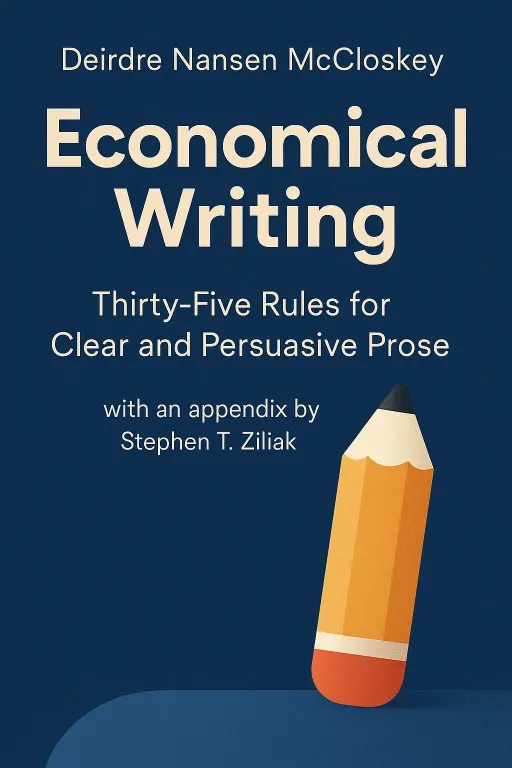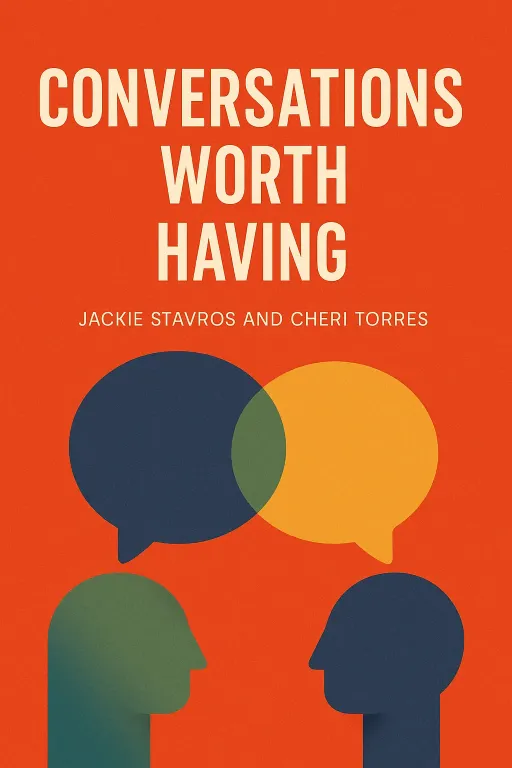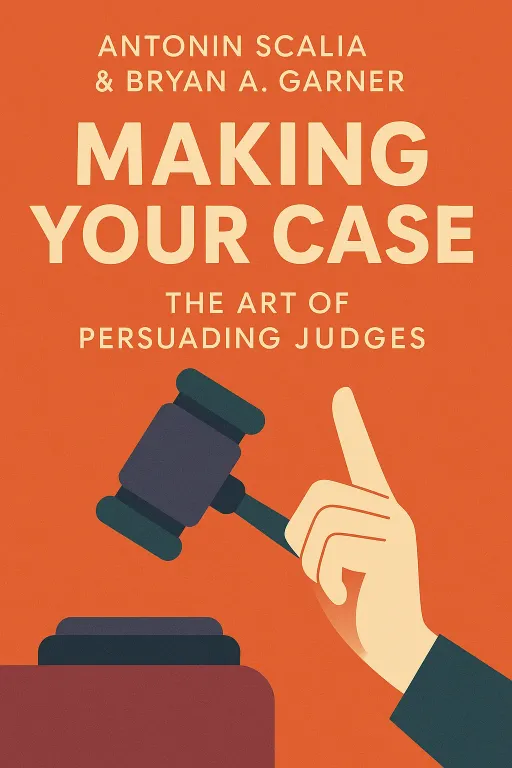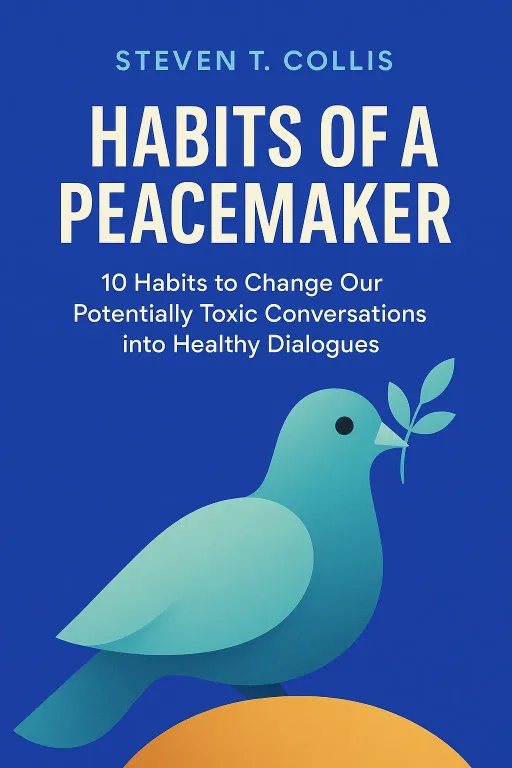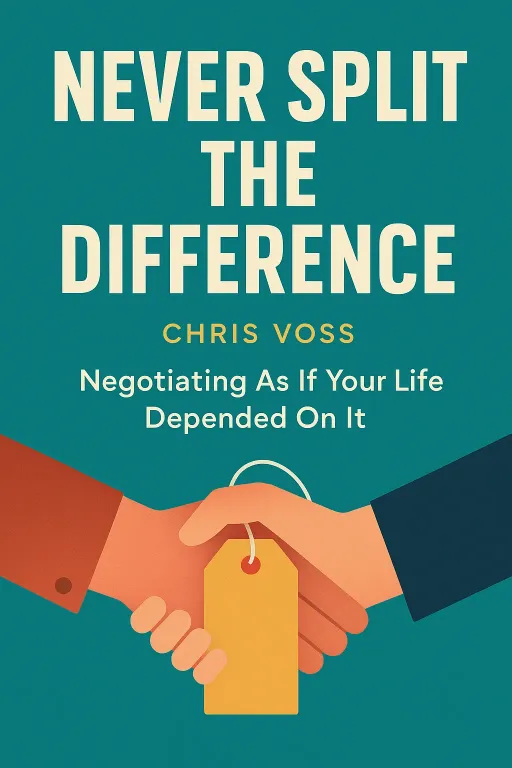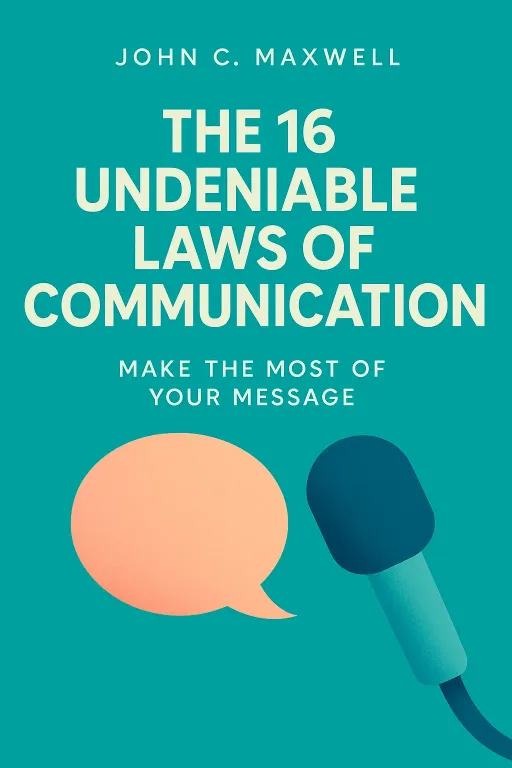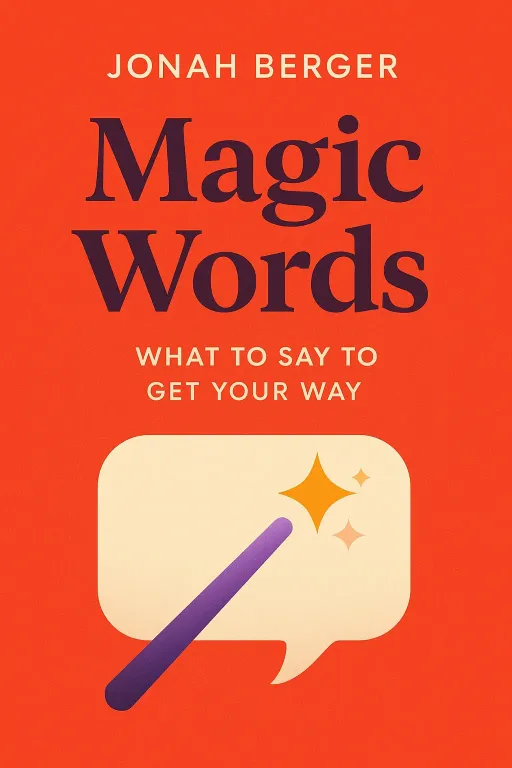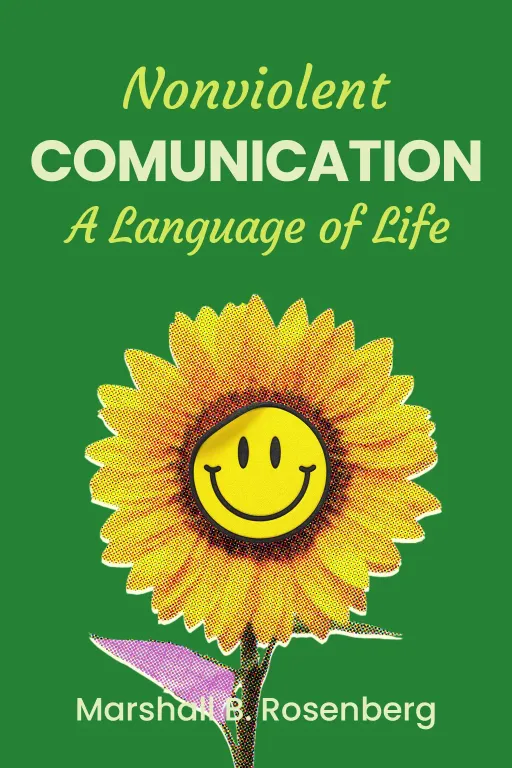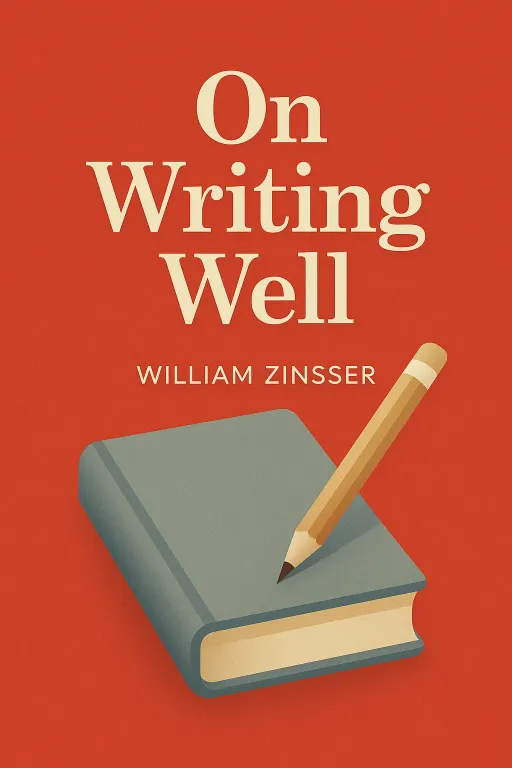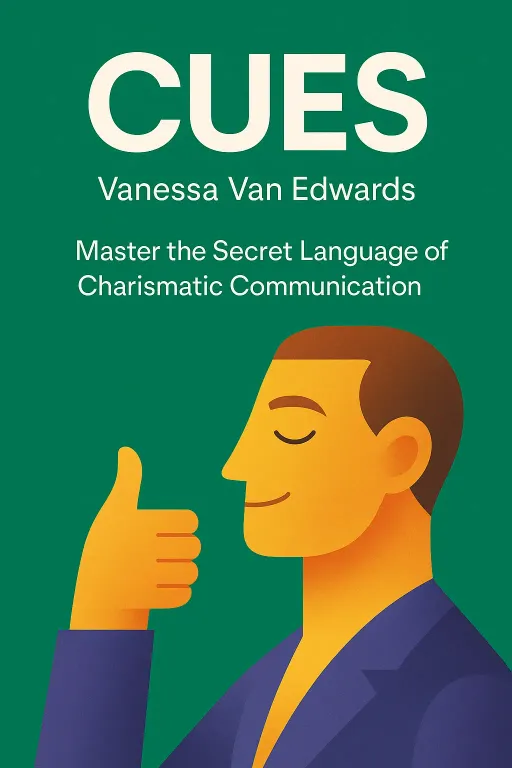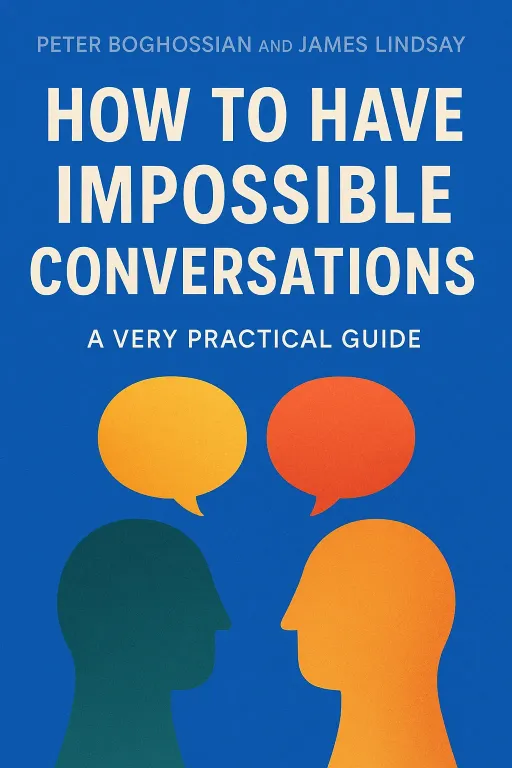
The Debater's Paradox
13 minGolden Hook & Introduction
SECTION
Michelle: A conversation is not a war. It's a collaboration. Yet most of us enter our toughest conversations armed for battle, and we almost always lose—not just the argument, but the relationship. Mark: Wow, that hits home. We've all been there, right? The Thanksgiving dinner that turns into a verbal cage match, where the only thing you win is a stomachache and a silent car ride home. Michelle: Exactly. And that's the central problem our book today tackles head-on. We're diving into How to Have Impossible Conversations: A Very Practical Guide by Peter Boghossian and James Lindsay. Mark: Oh, I know these names. Aren't these the guys who are kind of... professional pot-stirrers? Michelle: That’s one way to put it! They're the thinkers behind the famous 'grievance studies affair,' where they submitted intentionally absurd, hoax academic papers to scholarly journals to see if they'd get published. Several did. Mark: So the guys who specialize in creating intellectual chaos wrote a book on how to be civil? That feels like a firefighter writing a book on the joys of arson. Michelle: It’s a fantastic paradox, isn't it? But their argument is that their deep dive into ideological battlegrounds is precisely what taught them that the old rules of engagement are broken. They saw firsthand that you can't fight dogma with more dogma. You need a completely different toolkit. Mark: Okay, I’m intrigued. You’ve got my attention. Where do we even start to dismantle a lifetime of bad conversational habits? Michelle: It starts with a painful, and very personal, realization. One that co-author Peter Boghossian shares about himself, and it’s a moment of brutal honesty.
The Foundational Shift: From Adversary to Partner
SECTION
Mark: I’m bracing myself. This sounds like a confession is coming. Michelle: It is. Boghossian tells a story from nearly two decades ago. He was in a heated discussion with a liberal female colleague, who he calls SDL, about affirmative action. He was against it, she was for it, and the conversation quickly went off the rails. Mark: A familiar scene for many of us. Michelle: He kept pushing her for evidence, for data to support her position. She argued it was simply the right thing to do for marginalized groups. He kept pressing, interrupting, shifting the topic to corner her. He was in full debate-club mode, focused on one thing: winning. Mark: And how did that work out for him? Michelle: It ended with SDL getting completely frustrated, looking him dead in the eye, and saying, "You're an asshole. We're done." And then she walked away. Mark: Ouch. That’s a conversation ender, for sure. Michelle: It was a huge wake-up call for him. He realized he hadn't been listening at all. He was just reloading his next argument. He hadn't tried to understand why she felt so strongly; he just wanted to dismantle her position. He ruined the conversation and closed the door on any future productive exchange. He was an adversary, not a partner. Mark: That is brutally honest. But it’s so hard not to want to win, especially when you feel the other person is dangerously, fundamentally wrong. What’s the alternative? Just roll over and let them say whatever they want? Michelle: That’s the key question. The alternative isn't to roll over; it's to change the entire goal of the conversation. The book presents this powerful story about American POWs during the Korean War. The soldiers had been indoctrinated in training camps to believe their North Korean captors were cruel barbarians. Mark: A standard wartime tactic, I imagine. Dehumanize the enemy. Michelle: Right. But a psychologist later studied what happened in the camps. He found something fascinating. The POWs who were treated with unexpected kindness by their captors—a simple gesture, a shared cigarette—were far more likely to defect. That small act of humanity completely unraveled their indoctrination. The POWs who were treated neutrally or cruelly, as expected, held firm to their beliefs. Mark: Whoa. So kindness was a more powerful weapon than cruelty? Michelle: Infinitely more powerful. It shows that an adversarial stance just makes people dig their heels in. It reinforces their worldview. But when you treat someone like a partner, like a human being, you create an opening for them to reconsider. You build what the book calls rapport. Mark: So it's less about being a debater and more about being a detective. You're not there to prosecute them; you're there to understand the crime scene of their mind, to figure out how they arrived at that conclusion. Michelle: That is a perfect analogy. You shift from "I need to prove you wrong" to "I need to understand how you came to believe this." And once you've made that shift, you can start using the tools. But the first tool is the most surprising one. Mark: Lay it on me. Michelle: You have to put your facts away.
The Counter-Intuitive Toolkit: Why 'Facts' Fail and Questions Win
SECTION
Mark: Hold on. Put my facts away? But my beautifully researched, peer-reviewed, chart-supported facts are all I have! That’s my entire arsenal. Michelle: And that’s why you keep losing the war. The book argues that for most deeply held beliefs, especially moral or political ones, facts are surprisingly useless. Presenting contradictory evidence to someone who is committed to a belief often triggers something called the backfire effect. It can actually strengthen their conviction. Mark: That’s like every argument on social media, isn't it? Just people throwing links to articles at each other, and you can physically feel both sides digging their trenches deeper with every click. Michelle: Precisely. The book points to this classic study from the 1940s by psychologist Kurt Lewin. During World War II, the government wanted housewives to cook with sweetbreads—organ meats—because of meat shortages. Mark: I can already see the challenge there. "Honey, for dinner tonight, we're having pancreas!" Michelle: Exactly. So they tried two approaches. One group of housewives got a compelling, fact-based lecture on the nutritional value, the patriotic duty, all the reasons they should use sweetbreads. The other group was put into a guided discussion and asked to talk amongst themselves, to self-generate the reasons why it might be a good idea. Mark: Let me guess. The lecture group ran for the hills. Michelle: You got it. In the lecture group, only 3% of the women went on to cook with sweetbreads. In the group that came up with the ideas themselves? 37%. More than ten times as effective. Mark: Wow. So people are far more convinced by the reasons they discover themselves than by the reasons they are told. Michelle: It's a fundamental principle of human psychology. And this leads to a brilliant technique based on what scientists call the "illusion of explanatory depth," or as the book calls it, the "Unread Library Effect." Mark: The Unread Library Effect. I feel like I have that in my own brain. Michelle: We all do! Researchers asked people to rate their confidence in explaining how a common object, like a toilet, works. Most people were very confident. Then they were asked to actually write down a step-by-step explanation. Mark: Oh no. I can feel the panic setting in just thinking about it. There's a floaty thing... and a chain... and then water... magic happens? Michelle: That's basically what happened. When forced to explain the mechanism, people’s confidence plummeted. They realized they had a vague sense of it, but they didn't truly understand it. They had the book title "How a Toilet Works" in their head, but they'd never actually read the book. Mark: Ah, so you're not telling them they're wrong. You're creating the conditions for them to discover they might not be as right as they thought. That's subtle. Michelle: It’s incredibly subtle and effective. Instead of saying, "Your political policy is wrong, and here are the facts," you ask, "That's an interesting idea. How would we implement that, step by step? What would happen on day one? Who would be in charge of what?" You're not attacking; you're just asking them to open their own unread book. Mark: That’s a powerful tool. But I have to ask... isn't that a bit manipulative? It feels like a Socratic Jedi mind trick. You're guiding them toward a conclusion you already have. Michelle: That’s the big criticism, and the authors are aware of it. They argue the line is drawn at your intention. Is your goal to trap them and humiliate them, or is it to genuinely explore the idea together? If you're also open to discovering that your library has some unread books, then it's a collaborative search for truth. If you're just setting a trap, then yes, it's manipulation. Mark: That makes sense. It's about your own intellectual humility. Okay, so this works for toilets and sweetbreads and maybe even some political policies. But what about the really big stuff? The beliefs that are welded to someone's soul? The truly 'impossible' conversations. Michelle: For that, you have to graduate to the master class. You have to learn to speak an entirely different language. Not of facts, or even questions, but of morality.
The Master Class: Speaking the 'Moral Language' of an Ideologue
SECTION
Mark: The 'moral language.' That sounds both profound and incredibly difficult. What does that even mean in practice? Michelle: It's based on the work of moral psychologist Jonathan Haidt and his Moral Foundations Theory. His research suggests that human morality isn't just one thing; it's like a sound system with six different channels or foundations. Mark: Okay, what are the channels? Michelle: They are: Care versus Harm, Fairness versus Cheating, Loyalty versus Betrayal, Authority versus Subversion, Sanctity versus Degradation, and a sixth one, Liberty versus Oppression. Mark: I can already see how different people would tune into different channels. Michelle: You're way ahead of the curve. Haidt's research shows that political liberals tend to build their moral worldview primarily on the first two: Care and Fairness. Political conservatives, on the other hand, tend to use all six channels more or less equally, with a particular emphasis on Loyalty, Authority, and Sanctity. Mark: So when they're talking about the same issue, they might be hearing completely different music. A liberal is hearing a symphony of compassion, and a conservative is hearing a national anthem. Michelle: That's a brilliant way to put it. And this is why they talk past each other. If you make an argument about immigration that's based only on the Care foundation—"we must care for the vulnerable"—it might not even register with someone whose primary moral channels are Loyalty to the in-group and Sanctity of national borders. Mark: Okay, give me a real-world example. How does this play out? Michelle: The book uses a fantastic one: a tweet from Donald Trump about the drug fentanyl. He tweeted, "It is outrageous that Poisonous Synthetic Heroin Fentanyl comes pouring into the U.S. Postal System from China." Mark: I remember the outrage over that. Michelle: But look at it through the lens of Moral Foundations. "Poisonous" hits the Sanctity/Degradation button—our country is being defiled. "Pouring in from China" hits Loyalty/Betrayal—an out-group is harming our in-group. The implicit call to stop it hits the Authority/Subversion button—leaders must protect their people. And the underlying issue of drugs killing people hits the Care/Harm button. Mark: Wow. So in one sentence, he hit at least four of the six moral channels. He was speaking a language that resonated across a much broader moral spectrum than a typical political statement. Michelle: Exactly. And this leads to the master-level technique: moral reframing. You learn to take your argument and translate it into the moral language of the person you're speaking with. Mark: So, if I want to convince a conservative friend about an environmental policy, I shouldn't just talk about caring for the planet. Michelle: You could, but it might be more effective to reframe it using their moral channels. You could talk about it in terms of Sanctity—our duty to be good stewards of God's creation, to keep our forests and rivers pure and undefiled. Or in terms of Loyalty—protecting America's natural heritage for future generations of Americans. Mark: That's next-level. It's not about changing your argument; it's about changing the music that carries the argument. You're meeting them on their moral frequency instead of asking them to tune into yours. Michelle: You've got it. It's the ultimate act of conversational empathy. It requires you to genuinely understand and respect their moral worldview, even if you don't share it. And that is how you start to make the impossible, possible.
Synthesis & Takeaways
SECTION
Michelle: So we've taken quite a journey. We've gone from changing our own mindset from warrior to partner, to using curious questions instead of brute-force facts, all the way to learning how to speak different moral languages. Mark: It feels like the real takeaway isn't a list of tricks or tactics. It's a fundamental shift towards curiosity. The goal isn't to prove you're right, but to genuinely understand why someone believes what they do, even if you never, ever agree with them. It’s about valuing the relationship more than the win. Michelle: And that requires a degree of intellectual humility that is in very short supply these days. It means you have to be willing to examine your own 'unread library.' Mark: Which is terrifying! It’s much easier to believe my library is fully read and perfectly organized. Michelle: Of course. But the book really forces you to confront that. And maybe the most important question it leaves us with is this: Are you willing to be wrong? Because if you're not, you can't really expect anyone else to be. Mark: That's a powerful thought to end on. It puts the responsibility right back on us. We'd love to hear from our listeners. What's the most 'impossible' conversation you've had, and did any of these ideas resonate? Let us know. Michelle: This is Aibrary, signing off.
